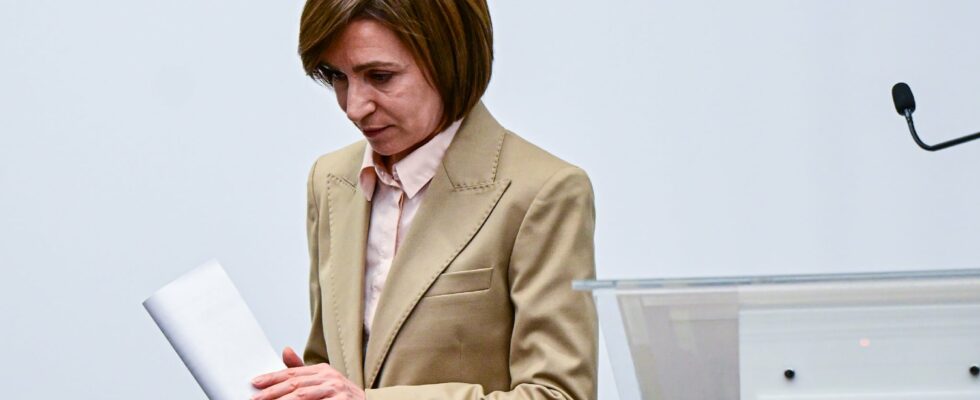The referendum organized in Moldova on the inclusion in the Constitution of the objective of membership of the EU gave rise to extremely close results, according to the almost final results published early this Monday, October 21 by the Electoral Commission. In a vote clouded by accusations of Russian interference “categorically” rejected by the Kremlin, the “no” vote dominated the race for a long time but the counting of ballots from the diaspora seems to have made it possible to reverse the trend at the last minute. After counting more than 98% of the ballots, the “yes” vote was slightly ahead with 50.03% of the votes.
In her first official reaction, outgoing President Maia Sandu denounced during the night, while the “no” was in the lead, “an unprecedented attack on democracy” and promised to “not give in”. “Criminal groups, acting in concert with foreign forces hostile to our national interests, attacked our country with tens of millions of euros, lies and propaganda” to “trap our country in uncertainty and instability,” Maia Sandu told the press, her face serious.
At the same time, the 52-year-old candidate came first in the first round of the presidential election with 38% of the votes. On November 3, she will face Alexandr Stoianoglo, a 57-year-old former prosecutor supported by the pro-Russian socialists, who did better than expected with nearly 29% of the vote.
Difficult second round ahead
Maia Sandu, who turned her back on Moscow after the invasion of neighboring Ukraine and brought her country’s candidacy to Brussels, had called this referendum to validate her strategy. And determine the “destiny” of this former Soviet republic of 2.6 million inhabitants. But his bet seems to have failed. Because even if the “yes” ultimately narrowly wins, this result, without calling into question the negotiations with the Twenty-Seven, “weakens in some way the pro-European image of the population and the leadership of Maia Sandu” , comments French political scientist Florent Parmentier, specialist in the region, for AFP.
The first woman to occupy the highest positions in 2020, this former World Bank economist with a reputation for incorruptibility has become a leading European personality in four years. In a complicated geopolitical environment, with Ukraine at war and Georgia accused of pro-Russian authoritarian drift, Moldova gave Brussels something to hope for, underlines the expert. However, after this setback, a victory for Maia Sandu in the second round is far from assured.
Alexandr Stoianoglo can count on the vote reserves of many small candidates “and the terrible trap of ‘All against Sandu'” risks closing on her, according to the analyst. During the campaign, this stern-looking man called for “restoring justice” in the face of a power ready, according to the opposition, to violate rights and pleaded for a “balanced” foreign policy, from the EU to Russia.
Massive vote buying system
Throughout the day, Moldovans responded, including those from the separatist region of Transdniestria, which hosts a garrison of Russian soldiers. “I came to give my voice for the prosperity, peace and well-being of our country,” said Olga Cernega, a 60-year-old economist, interviewed by AFP in Chisinau. Others, like this sixty-year-old jurist who only wanted to give his first name, Ghenadie, were worried about Moldova’s “western” turn, a loss of identity and judged that the current government “has made the situation worse”, so that part of the population has been impoverished by record inflation.
Between corruption and disinformation operations, the police have carried out 350 searches in recent months and carried out hundreds of arrests of suspects accused of wanting to disrupt the electoral process on behalf of Moscow. A massive vote-buying scheme has been revealed, targeting up to a quarter of voters expected at the polls in the country of 2.6 million people. According to the WatchDog think tank, Russia spent around a hundred million dollars to influence the vote. With, in the maneuver, the oligarch Ilan Shor, refugee in Moscow after a conviction for fraud. On social networks, he joked about the “rout” of Maia Sandu and her “lamentable failure”.
